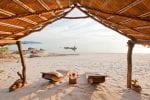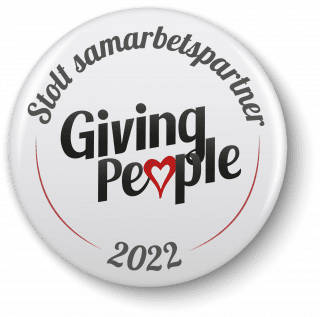A relaxed paradise right on the beautiful beaches of Lake Malawi, a lake that is actually one of the deepest in the world. Welcome to a complete experience with a unique taste of Africa. The clean and clear fresh water of Africa’s perhaps the most biologically diverse lake offers small coves and pristine beaches, boulders and a world below the surface of the water that invites to be explored. Many people compare life in the water here with what you can otherwise experience at, for example, in the archipelago of the Galapagos Isands. Get close to the culture of the Nyanja people – perhaps the area’s warmest and most memorable experience.
Contact form

Ecorating: 4.5
This product meets our requirements for Ecorating, a product that is good for humans and the environment.
Does my trip make a difference?
Read more
This product meets our requirements for Ecorating, a product that is good for humans and the environment.
Sample Itinerary

Nkwichi means “sand that squeaks” and it is also the sound of your feet when you walk barefoot on the sand on the beach. There are eight beaches to choose from in this area, which is 4 kilometers from the Rift Valley coast. Here you discover an oasis, a world that you thought was lost.

All cabins or chalets are unique where they stand among the trees. They are all individually designed and built from local materials. Luxury in the cool way, and with adventurous views of the lake.

Here you can experience an optimal retreat far away from it all. Book the size house that suits you, you and your partner or the family. Your own chef and staff to take care of you is a matter of course.
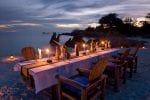
Enjoy great meals in the open air.

Sleep in a Starbed with only the sky above.
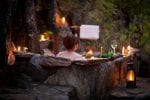
Luxury bathing outdoors.
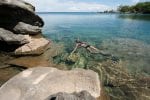
The clean and clear fresh water of Africa’s perhaps most biologically diverse lake offers small coves and pristine beaches, boulders and a world below the surface of the water that invites to be explored.
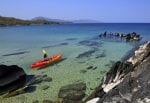
Other options:
* Take a canoe trip all alone
* Snorkel safari in the company of the most beautiful fish
* Canoe trip along the
shoreline of Rift Valley * Take a dhow cruise when the sun goes down
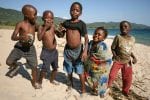
To meet with the Nyanja people are perhaps the best, warmest and most memorable experience of the place.
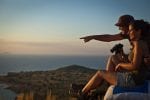
Explore the area’s small and hidden wonders. Join your guide from the local community. Take a walk along the coast on ancient paths, have a picnic under a 2000-year-old baobab tree, see animals and nature, visit small villages and visit spectacular views.
Trip details
Ecorating: 4.5
When can you travel?All year
Airport: Lilongwe Airport (LLW) Malawi and “Light Aircraft” to Likoma island.
Price includes: Full board, transfers
Likoma island: Likoma Island is the larger of two inhabited islands in Lake Malawi (also known as Lake Nyasa) in eastern Africa not far from the island of Chizumulu. Likoma and Chizumulu together form the Likoma District. The islands are actually only a few kilometers from Mozambique and they are actually within the border of Mozambique, but are still part of Malawi.
Travel Ethics: Malawi is, by and large, a place of tranquility. Here is not much traffic and absolutely no city pulse. The locals are friendly and you will find that they wave and say “hello” as if you were a dear old friend. You are welcome to answer with a “moni” which means “hello” in the local language Chichewa, or “Zikomo” (thank you).
Mobile & Internet: Internet at the hotel. The mobile network works fine.
Visa: Danish citizens can obtain a visa upon arrival in Malawi.See more here
Time Zone: GMT + 2
Vaccinations: Read more at Statens Serum Institut here
Luggage: Please note that you can have 15 kilos with per. bag – and the bag should be soft, preferably a backpack or similar.
Local currency: Malawian Kwacha
Weather: Weather in Malawion dmi.dk
Water: Clean water is available at the hotel Clean water is available at the lodge.
Security: Malawi is considered a safe destination.

Ecorating: 4.5
This product meets our requirements for Ecorating, a product that is good for humans and the environment.
Does my trip make a difference?
Read more
This product meets our requirements for Ecorating, a product that is good for humans and the environment.
Nkwichi financially supports the Manda Wilderness Project with a fixed amount per bednight fee from the guests.
The lodge consists of six chalets and two private houses. The property’s CO2 impact is very small and the facilities are built with local natural materials such as stone, bamboo and hay. If one were to remove one of the dwellings, nature would have converted it back to nature in only a few years.
Most of the site’s electricity comes from solar panels, and the use of petrol and paraffin is kept as low as possible. We work actively to ensure that the goods to be used are not wrapped in plastic during transport, and we work with recycling and recycling / composting of both organic waste and paper / cardboard. Used wine bottles are melted down into new drinking glasses, for example.
Nkwichi employs 41 permanent workers from nearby villages and sometimes up to 60 daily contractors. It is one of the largest individual employers in the entire province of Niassa. A new survey showed that each employee supports 15 others from their salary; this means that the lodge directly supports subsistence for over 600 people.
It is also estimated that there are other benefits from the lodge for up to 11,000 people, more than half of the population in the villages in the area. The lodge buys as many raw materials locally as possible – including vegetables and building materials. Some of the employees, who all receive extensive training at the lodge, have gone on to create their own successful companies, including accommodation, restaurants and even a hairdresser!
CONSERVATION
The other leg of the Manda Wilderness Project is Conservation. Nkwichi successfully protects its untouched 650-hectare concession, with 4 km of coastline, from poaching, overfishing and uncontrolled fires. As a result, zebras, warthogs, kudu and otters begin to return.
In collaboration with the communities, a large conservation area of 120,000 hectares (approximately the size of Greater London) has also been established. The Manda Wilderness Community Conservation Area (MWCCA) covers an area between the lake shore and the Brass River, 40km to the east. The beach and slopes have dryland forests, while it is sparsely forested on the savannah and marshland on the plateau. It is an untouched wilderness area with great potential for both wildlife and tourism. The latest wild sightings include wild dog, elephant, bushbuck, reedbuck, duiker, hippopotamus and leopard.
The purpose of the MWCCA is to encourage villagers to work together to make the most of their natural resources – and to avoid using them everywhere. With the help of local NGOs, the Nyanja communities have agreed to stop hunting wild animals and cut down wood for export. Instead, they focus on agriculture and tourism – activities that should provide better long-term results.
Community participation has been constant throughout the 12-year project. A local community organization, called the UMOJI (as “As One”), has been formed to represent all 16 villages in the area. UMOJI, of which Nkwichi Lodge is the founder and sits on the current board of directors, owns and manages the conservation area. A first in Mozambique, each of the communities also holds the titles of their own community country.
The next step in this project is to organize training for the UMOJI Association to help manage the conservation area, while implementing a professional management plan for the MWCCA, written in 2009 and approved by the Government of Mozambique in 2011. The area is then opened to tourists who pay fees for to visit the reserve. These revenues will be used to cover the operating costs of the MWCCA, with any surplus to the UMOJI.
The success of the Manda Wilderness Community Conservation Area will put the fate of society in its own hands, giving them a sustainable resource for future generations.
SOCIAL DEVELOPMENT
The third leg is the Manda Wilderness Community Trust (MWCT), established as a British charity in 2004.
It is run by an independent board appointed for its expertise in African development. MWCT serves as the primary vehicle for funding local development projects and fundraising for local NGOs already operating in Niassa Province. Donations have come from guests at the lodge, friends, schools and churches in Europe and the United States, as well as government development agencies working in Mozambique.
There are sixteen villages working with MWCT and each has a development committee that discusses and approves its most urgent development project.
